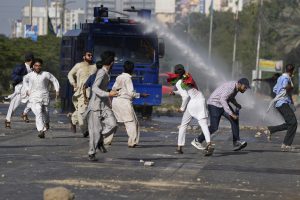In a watershed moment for Pakistan, the country’s former Prime Minister Imran Khan has been arrested in connection with a massive corruption case. The arrest is likely to keep him in police custody for days. It has sent shockwaves throughout the nation and set it on an uncertain course.
Khan’s arrest in the Al-Qadir Trust case is a major setback for the Pakistan Tehreek-e-Insaf (PTI) party. “The case relates to illegal acquisition of land and construction for Al-Qadir University involving unlawful benefit given in recovery of prime proceeds (190 million pounds) through National Crime Agency, U.K.,” Pakistan’s National Accountability Bureau (NAB) said in a statement. The NAB maintains that Khan and his wife struck a deal with Malik Riaz, a major property tycoon in Pakistan, that caused a loss of more than $239 million to the national exchequer in the scandal whereby prime land was transferred at meager rates.
The implications of this arrest are far-reaching and will have significant consequences for Pakistan’s political landscape.
Over the past year, Khan has been leading an agitation against state institutions to put pressure on them and evade arrest. His tactics have included targeting state institutions as a preemptive strategy and fueling violence. He has been able to successfully mobilize supporters and gain attention from the international media.
It is still unclear what impact this will have on the country’s economy, but it is certain that aftershocks will be felt in all corners of society as Khan’s supporters try to come to terms with this development. The arrest has sparked widespread demonstrations across the country. PTI supporters have taken to the streets in protest, engaging in rioting and attacking the houses of army personnel although their leader was arrested in a case pursued by the anti-corruption body.
Khan’s arrest has left the party’s second-tier leadership in a state of shock as they look for their next move and are unsure of how to pacify party workers. The workers, who for months have been led to believe that their leader was being victimized, are engaging in mass violence and there is no one from the party who can stop them. The entry of PTI workers into the Lahore corps commander’s house sets a dangerous precedent and could have serious implications for the party.
The recent violence by PTI supporters has set the party on a path to isolation and takes its confrontation with Pakistan’s powerful military to a whole new level. It is unlikely that Khan will receive any help from the military henceforth. The unrest has made it clear that state institutions, including the judiciary, are not going to come to his aid. This also means that any support he may have had within these institutions is now gone.
By engaging in violence, PTI has ended all chances of engagement and reconciliation with the civil-military leadership. This has further deteriorated the already strained relationship between the two entities and it is highly likely that Khan will be banned from participating in future elections.
Khan’s arrest comes at a time when Pakistan is on the verge of defaulting on its loans. The country is in the grip of a severe economic crisis. Rising inflation, unemployment, and poverty have made daily life for the masses extremely difficult. The country is in dire need of foreign investment to keep its economy afloat. For months, the International Monetary Fund (IMF) has been unwilling to release funds due to the lack of economic reforms, fiscal discipline, and political stability. Pakistan’s ongoing negotiations with the IMF are likely to face a further setback with Khan’s arrest.
The arrest of a leader of one of the most popular parties in Pakistan is set to increase political tensions. This is a tense time for Pakistan as it faces yet another political crisis that could potentially lead to more unrest and instability in the country.

































